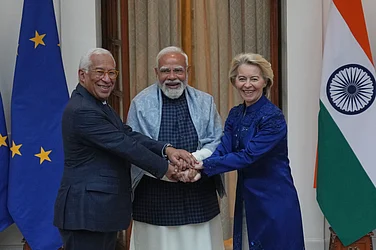The Kamal’s Beef With Kisses
For a few years now, a village in Jharkhand’s Littipara block has been playing host to the Siddho-Kanho mela. Its highlight this year was the “kiss of love” event, where married couples race each other while pecking on the cheek. Simon Marandi, a Jharkhand Mukti Morcha leader who was elected as the area’s MLA this year, has been organising the fair for some years. He says that the reason behind the ‘kiss of love’ is to increase intimacy among married couples, mainly from the Santhal community, as they face a high rate of divorce. Marandi has had to give an explanation for this quirky, mushy event because the BJP has taken offence to it. State BJP vice-president Hemlal Murmu has said angrily that “in Santhal traditions, a girl and a boy do not even hold hands!” Call it a ‘hyper-bramhachari’ paradox, shall we?

Health Boost For Punjab Politicos
In a bid to keep its current and former politicians healthy, the Punjab government has doubled their treatment allowance. The scheme can be availed by the state’s ministers, legislators, former MLAs and their dependents. The Punjab government has signed a memorandum of understanding (MoU) with 33 top corporate hospitals according to which the empanelment rates (rates applicable under the Central Government Health scheme) would be double of the old rates for government staff. Major facilities such as Medanta, Max, Fortis hospitals Delhi-based Escorts hospitals are among them. The idea to empanel these corporate hospitals was floated by the previous SAD-BJP government, which had begun the process during its last tenure.

Another Veggie Penance?
“I urge people to stick to vegetarian only,” was the recent appeal by RJD chief Laloo Prasad Yadav, who has just turned vegetarian himself. RJD sources say Laloo’s change of heart, and diet, is the doing of Shankar Charan Tripathi, an astrologer who had apparently told him that going veg could be the answer to his troubles. Laloo and his family have a string of corruption charges filed against them by the CBI and the Enforcement Directorate. But this is not the first time Laloo has gone green. He had stopped eating meat after the fodder scam as well, saying that Lord Shiva had told him in a dream to do so. His green evolution has not stopped at veggies; the trusted Tripathi had once advised him to forsake his crisp white kurtas for green coloured ones. That did not last long. Let’s see if this one does.

Fear Dials Bihar Ministers
On Sunday last week, Bihar deputy CM Sushil Kumar Modi made a bold claim while addressing a gathering in Calcutta—that Bihar’s law and order situation had improved, with the kidnapping industry having been tamed. But recent call records of some state ministers speak otherwise. Just a day before the claim, sugarcane minister Khursheed Alam is said to have received an extortion call. The caller demanded Rs 1 lakh. Only last week, a caller had demanded Rs 5 lakh from panchayati raj minister Kapildev Kamat; then independent MLA from Bochahan, Baby Kumari, had received a similar call. Though the police has taken action, ministers would have much to worry about—in August this year, bombs were hurled at ex-MP Baidyanath Mahto’s residence after he received an extortion call.

Flying Over Her Farms
The medical wing of the Royal Australian Air force has a new employee—36-year-old Manjit Kaur hails from a small farming family from Bhala Saryamalwala village in Punjab. She has been recently recruited as an aircraftwoman with the RAAF. Manjit went to Australia on a study visa with her two daughters and husband, who is now employed with the Australian government. According to her brother Gursahib Singh, Manjit’s uncle, who retired as a colonel from the Indian Army, inspired her to join an armed forces division. Therefore, when Manjit saw an opportunity to join the prestigious RAAF Down Under, she gave it her all. “She cleared the physical test twice before getting success on December 6,” said Gursahib.
An Elephant Selfie Blunder
Yes, the selfie is by now more than a phenomenon, it’s a legit form of self-expression too. But danger often lurks as punters try for the viral photo. So regular are fatalities that horrific videos of selfie accidents are a viral category in itself on social media. Just last week, young Jaydev Nayak of Nimiribedha village in Orissa, on spotting an elephant that had strayed from the herd, tried to click a selfie with the animal. But he went too close, the elephant flung him away. A critically injured Nayak was rescued by locals and forest officials, but eventually succumbed to his injuries.
Death Bringeth A Fortune
In August last year, the images of Dana Majhi, a tribal man from Orissa carrying the dead body of his wife wrapped in a mattress, came as a shock. Majhi travelled 10 km from the hospital where his wife died of tuberculosis to his village since an ambulance wasn’t available. Media reports generated a lot of sympathy for Majhi, with the PM of Bahrain giving him Rs 9 lakh and other organisations also chipping in. This year, reports of a new Majhi are emerging. Photos show him atop a new Hero bike. Majhi has married again and the house allotted to him under the Pradhan Mantri Grameen Awas Yojana is being built. There is no news of improved ambulance service at the hospital.

Imam Crosses A Line
At a time when many secular democracies are bowing to pressure from religious leaders and allowing them more space in running their societies, Bangladesh has taken a bold step to push back this onslaught from clerics. A Muslim cleric accused of issuing a fatwa banning women from working at farms has been arrested recently.
The imam in the western town of Kumarkhali and five of his associates are now facing charges for preventing women from going to work in the fields.
“They took the decision after prayers on Friday, banning women from going out of their homes,” local police chief Abdul Khaleque said. “They used the mosque’s loudspeakers that evening to spread the news,” he added.
Bangladesh, a Muslim majority country, is officially secular. However, for political exigency, various leaders, including Sheikh Mujibur Rahman, the founder of modern Bangladesh, had often hobnobbed with religious leaders and fundamentalist Islamist parties. However, throughout its history, a parallel stream stressing the secular credentials of the country had been strong.
Prime Minister Sheikh Hasina too, have in the past relied on religious fundamentalists to further her political cause. But since the murderous attack on her more than a decade back, she has launched a relentless fight against these religious forces and tried to isolate them. But preventing women from pursuing activities that allow them to earn a livelihood, especially in rural areas where clerics have greater influence, can have a negative impact on the country’s economy.
Women were once largely confined to the home in rural Bangladesh, but a labour shortage has meant millions now work in the fields during harvest and crop-sowing seasons.
Women also account for some 80 per cent of four million workers in the country’s 4,500 textile plants, the mainstay of the impoverished nation’s economy.
Fatwas were banned in Bangladesh in 2001. But the Supreme Court had ruled in 2011 that they could be issued on personal and religious matters if they did not impose physical punishment. However, this had been criticised by rights groups who pointed out that in villages far away from the country’s secular courts, fatwas are issued to pass sentences that go against the nation’s laws.
Police said the six arrested would face charges under the 1974 Special Powers Act, a controversial military-era law, that too had come up for criticism in the past.
Illustrations by Sajith Kumar


























